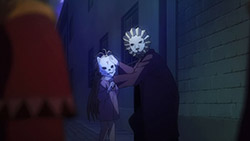 |
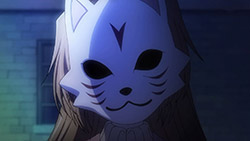 |
 |
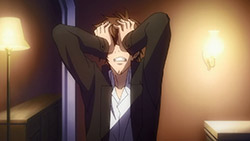 |
 |
 |
 |
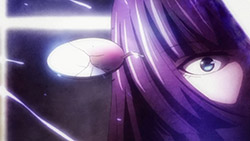 |
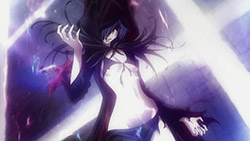 |
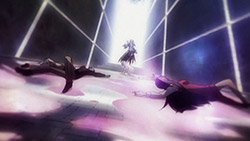 |
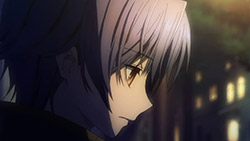 |
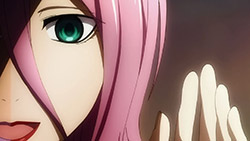 |
 |
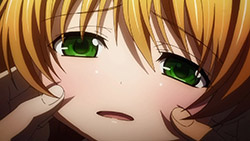 |
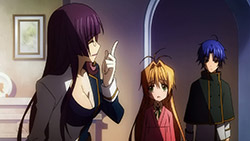 |
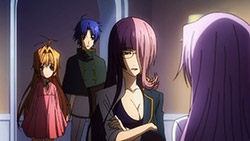 |
 |
 |
 |
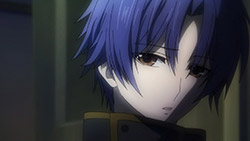 |
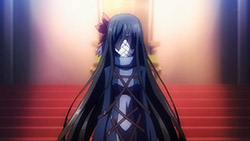 |
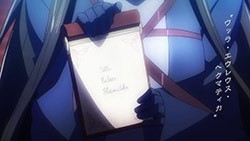 |
 |
 |
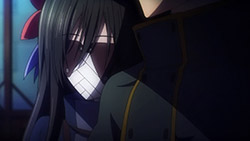 |
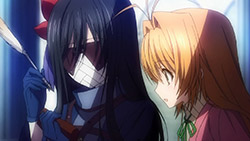 |
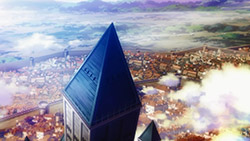 |
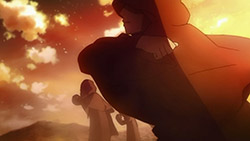 |
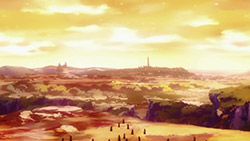 |
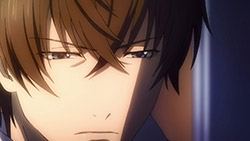 |
 |
 |
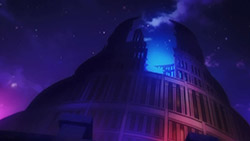 |
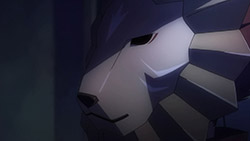 |
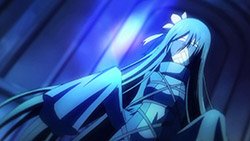 |
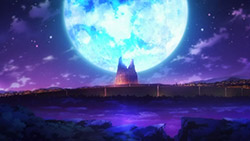 |
「オルタスII」 (Orutasu II)
“Ortus II”
Ortus: a powerhouse of order in a world filled with chaos. The city is so orderly and the lifestyle is so appealing that even the living admit that life would probably be better as a dead person. As such they surrender themselves to the city’s queen and give up their old life in search of a renewed one, renouncing life and accepting death. However, in the land of Ortus, the dead simply don’t seem to have differed at all when they were living. Oh yes, everyone wears masks to conceal their harder-to-maintain bodies, but aside from that, the people of Ortus are just like any other nation. They have pride in who they are, they laugh, play, buy, have emotions, and live just as any other living city would.
Thus, from a purely sociological standpoint, the initiates of Ortus must die as a symbol of their oath of loyalty, of their commitment to the ideal of the undead city. It’s not for any actual benefit other than preserving the nationalistic feelings born from a conflicted age. It’s very much like when immigrants finally naturalize in their target country–one must first renounce their citizenship before taking on a new one for the sake of national identity. As such, while it does horrify Ai that Ortus asks these people to renounce their lives for the state, the actual matter of “switching sides” is not a big deal. Life will go on as normal, and while the initiated can never go back to being human, the current situation indicates that such a tradeoff would be unfavorable anyways. This thought process of course is based on the knowledge we have right now, and it very well could be (and most likely is) that Ai will find an even darker side to Ortus that’s completely disagreeable. However, as it stands now, the distinction between life and death has been blurred by Ortus, where each side can be just as human or inhumane as the other.
I look forward to seeing how the show will continue to explore these issues of the living vs. non-living in an ambiguous manner, for that’s what has been carrying this show so far. I’ve been less interested about Ai as a character (though her ability to get in ANYWHERE is remarkable), or how gravekeepers are mysterious beings, or even how people can go through fake pregnancies, than I have with asking the question, “What is human?” No longer can we view Ortus as an enemy of humankind, but rather as a fellow race of mankind that has differing views on the world, just like every other race. God may have abandoned the world, but it sure seems like some groups are doing just fine, where the undead can even enjoy a better life than those whose hearts are still beating. Along with continuing to illustrate beautiful backdrops that are more pleasant to gaze at than the animation, I hope that Madhouse continues to push forward this focus on the gray area, rather than some fantastical plot that’ll solve everything.
—
Side-note time! With the revelation of how Kiriko came about in this world, one has to wonder…why did they choose to stitch up Kiriko’s “parents” like that? Wouldn’t it be infinitely easier to stitch them up as their proper matches? However, I suppose one benefit does come out of being split–when one half knows about something, the other half knows immediately. Unless the two halves did physically communicate between last episode and this episode, Pox’s halves (her other half was featured this episode) may be able to telepathically communicate. Interesting power to have, though two heads controlling one body never ends up well.
Full-length images: 9, 21, 32.
Preview
 |
 |
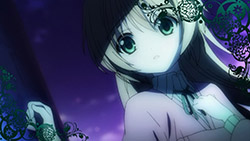 |

The princess is so cute! What is this? Bondage Moe???
Madhouse needs to turn it down a notch. There’s too much adorable moe for me. My heart can’t handle it.
I was shocked at the inclusion of something like this. This happens too
in real people; it’s rare, but you don’t hear much about it because of the
social stigma attached (also the symptoms are much different). Close sisters,
one of which can experience this if the other becomes pregnant.
Interesting series, not sure how it’ll turn out in Ortus. Hard for me to imagine
burying over a million dead. Will they be allowed to continue, I mean, it’s
the Gravekeeper’s job to provide a proper end.
One of my favourites this season.
It’s called pseudocyesis. And there’s nothing metaphysical about it. It is a purely psychological/physiological phenomenon which occurs as a result of an intense desire to become pregnant, or a delusional belief that one is pregnant which deceives the brain into secreting hormones related to pregnancy which then proceed to induce the physiological symptoms of pregnancy in the subject. Risk factors include things like lack of education or mental illness- and rarely, it can even happen to men…
You can tell that to Arnold Schwarzenegger.
In this case, Scar hasn’t the desire of a baby and it was all triggered by that voice she hears.
Maybe is a child-like voice or a parent-instincts trigger voice?
With this episode, I am personally believing that we’re seeing the world more or less together with Ai, but then we get early glimpse due to some preview. Whoever did the preview seemed to have no idea about the plot.
My guess for next week below:
Show Spoiler ▼
btw: DAT scenery porn…
Wikipedia says that this thing in light novel form won a prize. And not a crummy consolation prize either, but the grand prize of what appears to be a rather prestigious competition which has only had five grand prize winners since its conception. Really? Well, I can kind of understand why. Its world is built around many interesting and marginally original ideas (Emphasis on marginally)- which creates a relatively strong sense of atmosphere. And its characters are conceived and utilized in a manner that manages to be somewhat more emotionally compelling than average.
Yet in spite of all its strengths this story is fundamentally flawed being riddled with textbook examples of schoolboy storytelling no-nos; the inexperience of the author of the light novels is clearly evident. Three elementary errors are constantly repeated.
The first elementary error is the mis/overuse of a specific literary technique that I like to call “disinformation.” The term “disinformation” as applied here refers to the intentional obfuscation, falsification or withholding of information from the audience by the author in an attempt to create certain effects such as an atmosphere of mystery, an emotionally compelling scenario or to evoke suspense/prevent predictability. There comes a point where constantly spouting vague or confusing theories about the nature of events or even about the governing rules of your world simply becomes rage-inducingly confusing for a significant subset of the audience in almost every setting except for ones that are fundamentally meant to be confusing (Like Inception)- and this show crossed that line with Ai’s dad…
The second elementary error is the overly convenient construction of important plot events- like how the man previously established as immortal suddenly dies at the most emotionally compelling moment for him to do so, and how Ai’s illogically exaggerated naivete/curiosity is utilized a means of pushing the plot forward. These sort of elements give stories an uncanny property that detracts from immersion because it interferes with the suspension of disbelief- more logically oriented members of the audience are going to be put off.
And finally the most oft-cited elementary misstep is how often this tale appears to so blatantly and wantonly disregard the (seemingly) established rules of its own universe- like how it was said that the undead usually turn feral within two months whereas the people of Ortus are and the villagers were somehow able to maintain their sanity indefinitely, and how the immortal man somehow suddenly dies for no clear reason at all. Whether or not explanations are eventually provided for these (apparent) contradictions the author has again done irreparable damage to the believability of the world- a world is its rules after all and a when every single established rule of a fantasy world appears to have been contradicted consecutively it becomes more difficult to suspend your disbelief and immerse yourself in the world because there is no logical basis to ground its existence in. It must be noted that it is only important for the rules to appear to have been contradicted to damage the suspension of disbelief- because a fantasy world is constructed from nothing and a firm, logical image of a world can only be formed in the mind with a proper framework of universal rules- when every rule that has been previously established is consecutively broken without immediate adequate explanation the world loses its logical basis and becomes less believable. Again many analytical thinkers will be alienated.
Ultimately KamiInai is a show with lots of heart and an interesting premise but rather amateurish in terms of actual literary technique. If you’re a logically oriented person, or into literary criticism chances are you’re going to have a few problems with it. But most people aren’t these things so I would imagine that they won’t at all be put off by the aforementioned problems. Hmm, emotionally compelling but mechanically broken- a glorious trainwreck according to Stilt’s definition of the term if I ever saw one…
http://i.imgur.com/5oWQ87H.jpg
Lol, because I find it to be cathartic? You see, I have a condition. Analysis and argument is like crack to me…XP
I only posted that image to show that even the biggest fan of an anime can feel embarrassed at the unrealistic plot devices being used in favor of an attractive show.
I even agree with most of what you said, however most people just can’t handle or want to think too deeply in terms of entertainment, and even as I share your thoughts regarding how silly it is that people just don’t want to analyze something they have a vested interest in, I feel that the moment you try to justify the reasons why a show is average to someone who sees it from another perspective, you start to think how a show could be better if it were to cater to your idea of how a plot should be. Its mostly a waste of breath because I doubt most fans of the show would have watched this far without agreeing with the way the premise is laid out; characters driven by emotion rather than logic.
If they were agree with your logical discussions and see as an average piece of work, that would severely subtract from their viewing experience. As they say, ignorance is bliss at most times.
Thanks for agreeing with my observations! 🙂
Yeah, I do see what you mean, no one really wants to analyze stuff and people would rather not think about and just enjoy what they enjoy. I don’t think I’m actually trying convince anyone of this show’s mediocrity though. I’m only interested in the production of universal transcendent classics after all- and my analyses hinge on one thing alone; where does a tale fall short of this elite standard? Even stuff that is rated 9/10 or 10/10 by most reviewers may get torn apart by me critically because it might have attained such scores by emphasizing certain major evaluational criteria while neglecting others. Just look at my comments on Shingeki 02 several months ago- love the show, but I still tore it apart because it falls short in some ways. A universal transcendent classic however attains a high score for all major criteria of evaluation- it is nigh immaculate as a whole and is not carried by one or two disproportionately strong elements. In fact I’d say that at times the better a story is overall the more fiercely critical I will be of it because it irks me that the author got so close and would have achieved it if not for glaring flaw X and/or Y, Z, etc.
In other words I’m not trying to say that the show is average or even bad. I’m trying to say that whatever the actual overall quality level of the show happens to be it isn’t as good as the greats of history and there is still significant room for improvement- and here are the major areas where I thought the author could improve on his/her work, in pursuit of that uber-elite level of quality.
I like your observation here, reminded me of something important that I forgot to mention earlier on. What the author of KamiInai does with overly convenient plot points is very interesting. A specific technique is applied which I like to call the “emotional obfuscation of broken logic”- I am uncertain whether this was done intentionally or unintentionally as an instinctual empathetic talent but it is an interesting plot device and in its own way quite skilled. The emotional obfuscation of broken logic occurs when an author utilizes unrealistically convenient or outright illogical event progression in the plot but compensates for this by making what happens very emotionally compelling. As we are well aware, emotion overrides logic in most people and when confronted with a plot event that is highly emotionally compelling, they will become quite willing to overlook any concurrent logical problems.
This is the phenomenon that we are seeing here with this show. Most viewers vehemently defend its quality in spite of clear logical problems with the plot because the events in question were by design highly emotionally compelling- it’s basically a sort of cognitive illusion, much like an optical illusion. Overly convenient villains and a poor explanation for the immortal man dying? No problem- because he went out with a bang. Ai is unrealistically naive and curious and her adoptive parents are illogically permissive? No problem- because she’s so cute that it doesn’t matter! Hocus-pocus motivation for entering the city? It rocks because it was related to Ai’s Mom’s dream– oh, so touching! You get the picture.
There are major problems with this technique however that make it a second-rate plot device that should be used sparingly, or more or less never at all if you’re aiming to write a tale for the ages. Chief among these problems is the fact that emotional luster is lost over time. The first time you read/watch something is often the time when its emotional effect is the strongest. This powerful initial emotional effect is what is causing most people to overlook the blatant logical problems of this show, and overlook them they will, at least for now. The problem is that several viewings in this emotional effect will become greatly diminished eventually arriving at a point where it no longer compensates for the logical flaws for many people- then five years down the road you end up with a bunch of folks who rewatch your show and decide that they didn’t really like it as much as they thought they did after all, and there goes your legacy. You may have had killer initial sales but by the next generation you’ll probably end up being forgotten nonetheless.
Also there is a significant minority of the population who are analytical thinkers; these logically driven individuals will simply dislike your stuff outright- the emotional illusions simply don’t work on them. By over-utilizing the emotional obfuscation of broken logic you alienate this significant portion of your potential audience- the best tales appeal to both intuitive and analytical thinkers by maintaining more or less immaculate logical integrity and managing to be very emotionally compelling at the same time. The emotional obfuscation of broken logic is a second-rate plot device in most cases because the illusion it casts doesn’t last forever and because it sacrifices an important element of storytelling/immersion (Logical integrity) for another (emotional compulsion). The best tales of all time however have it all with minimal sacrifices involved if any…
Her dad didn’t die for no reason. He wanted to die loved and god granted that wish for him (same as the Albino issue.)
It seems like Ai wants to try to attain her mother’s dream as well as fulfill her father’s mission.
Not a fan of the moe-ness but the story’s been pretty solid so far.
The whole “mother dream” thing. Yet another overly convenient plot device. At the moment when her adoptive parents decide that entering Ortus actual would be too dangerous the author suddenly pulls it out of thin air. And most of the audience falls for it. Why? Because it is such an emotionally compelling reason which overrides the fact that the manner in which it was revealed was unrealistically convenient. Emotion overriding logic- a classic example…
@Zen
Hmmm, have to disagree. The Mom’s dream was established early on from what she said when you see her and Ai on the roof overlooking the village. It just wasn’t explicitly said, but is obvious once you watch the following episodes. Though she was a gravekeeper she never buried the dead of the village.
Everyone’s perception is legitimate including yours, Bear. A “problem” arises when a plot element is written in a manner that would cause a substantial number of people to perceive a “problem” and therefore dislike the story- because this affects the bottom line (sales and legacy) that is the primary concern of the author. Well perhaps the mom’s dream thing is the three of diamonds in the deck of problems- the smallest one of all- but small as it is it does contribute to causing the perception of a “problem”…
My counteresponse would be that we are at this stage, still rather early in the world-building. Then again, it might be because we are seeing this from the narrative of Ai – and seeing it from the narrative of someone younger, naive, and largely ignorant of the world makes these lapses and seeming contradictions in world-building more… forgivable, in the sense that it has less of an impact on the suspension of disbelief. Because, it is seen from the eyes of ignorance, in a world where reality seems to be slowly slipping away to begin with.
Now, if by the 13th episode, the anime is going nowhere towards addressing these contradictions, then I admit that you might have a point here. But Kamisama seems to be going on the theme that the rules of the world are literally falling apart, and riddled with exceptions ,aberrations and contradictions in every corner.
There is a such a thing as overdoing it. Loosely defined “overdoing it” occurs when your use of events that appear to contradict the governing rules of your universe creates significant dissent among the audience- and that occurs when the rule-breaking is so prevalent that it leaves little logical basis upon which mental world construction can be based. I get it, you want to create a world “where nothing is as it seems.” But that doesn’t mean that you have to present your world initially in a manner that makes no sense- a better way of producing the effect without adversely effecting immersion would be by presenting events that appear to contradict the rules and then immediately providing the audience with a subsequent rule-consistent explanation- doing so will simultaneously create a sense of mystery while also firmly cementing the defining rules of your universe into place, which will result in a net gain in both immersiveness and mystery. Whereas the other technique of utilizing direct rule-contradiction that remains unexplained in the long-term expends immersion capital by diluting the image of your world- as mentioned before a world is its rules, a well-realized world is immerssive because it operates by a set of strict physical rules. When you make your world appear as if it does not you reduce the believability of your world- in the big picture this effect can be nominal if the technique is used sparingly but when overused as it is here you expend so much immersion capital that you actually begin to have a significant adverse impact on overall immersive value.
Now, I’m not saying that this show is something that should considered by the everyone to be “objectively bad” overall. Because it isn’t. Clearly public consensus is that it is likely at least above average if not rather good. What I am complaining about is the tendency in the public’s colective evaluation of 21st century popular writing to focus too much on things like emotional compulsion and interesting ideas while disregarding the importance of actual, solid literary technique. Which is why stuff like SAO and Twilight is so popular. These days being emotionally compelling with a few interesting ideas is sufficient to attain massive appeal, exceedingly strong literary technique is not required- but is your tale truly transcendent in spite of its current popularity? If your goal is to create a tale that truly stands above them all as a monument for the ages then you cannot neglect the literary element of the narrative. I seek such tales, and when a story that has the potential to attain such levels fails to do so, naturally I will be fiercely critical of it, and delineate clearly where its failings lie. Bad? No. Just not transcendent.
Meaning only stupid people like this show right… >_>
Lol, what? No! Emotionally driven people like this show. Intuitive thinkers who follow their hearts- by not means does this imply stupidity, it just means that you’re empathetic (A highly desirable character trait by the way)- level of intelligence is irrelevant. Whereas analytical thinkers are logically driven- they don’t follow their heart, they follow their brain so anything illogical is automatically “bad.” I honestly don’t have clue which category I fall into. I do in fact enjoy this show and understand its emotionally compelling appeal- but even so its logical flaws remain readily apparent…
If I stop to think about it I agree on most,maybe all of Zen’s points but I’d rather not do too much as I might drop the show > <
The world they live in is the thing that draw's me most to the Kaminai(well,and some of the eye candy).It used to be Humpnie as well but so much for that.This show is an interesting experiment for me as I usually put too much emphasis on good characters and this show is pretty lacking there.However,like Zanibas said,I'm curious about these living vs non-living issues and if we'll eventually reach any conclusion by the end instead of just watching the adventures of Ai in
WonderlandDeadland where everything will stay the same as usual but she’ll grow more as a person.Don’t get me wrong,I never say no to character development but it’s already episode 5 and she hasn’t managed to make a lasting impression on me,whereas some do it in the 1st episode(8man,or to be more summer season specific,Staz).Well, Zen’s clarified that they don’t think it’s a matter of intelligence. But nonetheless I think that trying to neatly divide people up into emotional or analytical thinkers and make definitive statements that the former will like this particular show and the latter won’t is both a big assumption and a vast oversimplification, to the point where it has basically no utility.
The dichotomy of the two styles of human information processing is not at all arbitrary being a well-accepted concept in the field of psychology, and even played an important role in the Nobel Prize winning paper of psychologist Daniel Kahneman. Basically, the theory posits that humans process information in two ways, the first being through intuitive thinking which is a fast and autonomic process that is often heavily influenced by emotion which is habitual and nigh immutable. The second is through analytical thinking/reasoning which is a slower process involving deliberate and effortful thinking.
Individuals may be inherently more or less prone to processing information either intuitively or analytically to differing degrees; every person falls at a point on the spectrum between the two and none is perfectly intuitive or analytical. Psychologists determine a person’s dominant method of information processing through simple tests like this. These questions are designed to make people intuitively perceive a wrong answer. Intuitive thinkers are more likely to follow their gut feeling/emotions and will usually go with the subliminally suggested wrong answer when just a little reflection would have uncovered obvious logical problems with that answer. Analytical thinkers on the other hand tend to be more careful. Instead of following their instincts they usually think about the answer more carefully and so they arrive at the right answer more often. Not that either is inferior to the other, one just likes to follow his gut while the other likes to think things over a little.
As proven by this simple test intuitive-dominant thinkers are more liable to overlook or dismiss as inconsequential obvious logical flaws in favor of following their gut instinct/emotions. Whereas analytical-dominant thinkers will usually notice such flaws because of their tendency to closer reflection. And like I mentioned above this story heavily employs a plot technique that I christened “the emotional obfuscation of broken logic” where illogical plot events are used as a means of attaining powerful emotional effect. Under normal circumstances illogical plot progression tends to be severely damaging to the aggregate perceived quality level of a show but that is not so here because the illogical plot elements are obfuscated right as they occur by the simultaneous and powerful emotional effect that they are carefully crafted to produce.
The bad logic is “justified” or is rendered outright invisible in the eyes of many viewers because it is subliminally obfuscated from their perception by an intuitive/emotional cue. Just like in the test questions mentioned above where the logical flaws in the the intuitive answers are rendered invisible to subjects because of obfuscation through careful wording which subliminally introduced intuitive cues leading to the wrong answer, the author of this work obfuscated the broken logic of the plot by creating similar intuitive cues, in this case through the sense of intuitive justification/legitimacy that comes from powerful emotion (The “It just feels right” impulse) instead of simply using clever wording. So the logical problems in the plot are rendered invisible or inconsequential to the majority of the audience (intuitive-dominants and even weak analytical dominants through sheer force of emotion) because of powerful emotional subliminal suggestion. But most strong analytical-dominants are alienated, and this is a sizable chunk of the population.
Through this it is evident that the emotional obfuscation of broken logic operates by the exact same psychological processes through which the aforementioned test does. So just like the test, intuitive-dominant thinkers are more likely to disregard or simply not notice the obvious problems of logic with the plot and love it to pieces while analytical-dominant thinkers are more liable to look past the emotional veil and see its real underlying logical flaws, perceiving an actual problem of quality. This division isn’t a clean one of course, not all intuitive-dominants will love the show and not all analytical-dominants will hate it, but like religiosity, in theory one would expect that information processing style would be a powerful predictor of whether or not someone might like this show.
So as you can see my argument that intuitive-dominant thinkers are more likely to enjoy this show than analytical-dominant thinkers is not at all an arbitrary assumption, nor is it simplistic. It is an intricate theory which has a basis is cold, hard science. In fact I’m convinced that the primary reason why what I wrote was received so poorly (Normally I get a pretty tight like/dislike ratio) is because most of this show’s audience is made of intuitive-dominant thinkers who emotionally intuit merit in the story and cannot cognitively fathom that any arguments suggesting otherwise could possibly be legitimate or even plausible…
You talk and talk and talk. That’s the first sign of unintelligent.
And since when did you were able to read Japanese?
Took several years of classes when I was younger- not great at reading or writing it admittedly but my abilities are probably serviceable- likely grade school level at least…XP Haven’t read the light novels either but the anime seems like it’s following the original story very closely. And in-depth analysis is the foundation of every important field of study- talking lots is wonderful! Express yourself! Argue! Form opinions! That’s how we grow mentally as people…:)
Nah, the anime doesn’t follow the anime properly. If you want to talk, discuss about the anime, and stop blaming the author when you don’t have the slightest clue on what you are talking. It really makes you look stupid, even with all the useless and avoidably lengthy “in-depth analysis”.
Even if conversational liberties were taken with the anime I highly doubt that the climactic plot points which sacrifice logic for the sake of emotional compulsion that are the central issue of contention here were much altered between the two versions. Seems very unlikely. If you alter climaxes you alter the story- diehard fans would be complaining about the show being “untrue to the source” if this was the case- I haven’t seen any evidence of this. Of course, if you want to point out specific examples of instances where the author in fact did not utilize subpar plot techniques like the emotional obfuscation of broken logic or overly convenient events and the anime took creative liberties and messed things up on its own then please do so- if I made a mistaken evaluation because of a lack of information then I will readily admit to it- but I think that we can all agree that in an adaptation that is true to the source material (Which this presumably is) the person most responsible for any problems with major plot events is likely to be the original author. The mark of intelligence is presenting evidence for your contentions- explaining why you believe the anime messed up on its own where the novel did not- A person believes that X is true? Well, others are not interested in the fact that he believes X to be true- it far more important why he believes X to be true…
In other words without clear and convincing evidence otherwise it is a safe, probabilistically sound assumption that the original author is primarily responsible for literary problems with major plot events and climaxes in an adaptation that is considered by fans to be true to the original…
Okay, list out all your complains, and we will do the comparison between LN. Of course, I assuming you had watched the anime properly and couldn’t find the explanation yourselves.
>diehard fans would be complaining about the show being “untrue to the source” if this was the case- I haven’t seen any evidence of this.
Perhaps you should be looking at Japanese boards, instead of here?
>in an adaptation that is true to the source material (Which this presumably is)
You’re assuming so that you can easily criticize. You’re “assuming” for the sake of your convenience.
You see, it’s not that hard to know that you can’t even read Japanese from your previous posts, because those posts are unintelligent trying to look like intelligent. I applaud the efforts though.
Complaints were listed and explained above. Please promptly provide detailed counter-arguments and explanations. And in the presence of a lack of information assumptions are completely legitimate- we make assumptions to deal with problems in daily life all the time.
Zen’s complaints are correct and legit, although the anime isn’t over yet as well the novel.
For making exhaustive criticism and judgement about this story and,even more, the author’s storytelling abilities, is necessary to wait until the end of the story (the anime will only adapt the first four volumes) to see if the author is able to explain the rules and the course of action.
Thanks for your support, StarFang! 🙂
You are right, for evaluating the objective quality of the entire story overall we must wait until the whole series of light novels is complete.
But early evaluation of the author’s skills is particularly pertinent for light novel series because they often take many years to complete. Often his/her skills will have improved many times over by the end of the run. Early books in a series frequently appear “greener” than the later ones, especially for debut series.
Because of this progression of skill over time, it is unfair to overlook evidence of amatuerish, green storytelling technique in earlier books simply because it was compensated for with vastly improved literary skill in later entries. And if such discrepancies of literary prowess are indeed found in earlier works, they should not be construed as a black mark against the author but taken rather as a sign of the continued growth of a fledgeling writer, something to be celebrated…
@Zen
You haven’t read the novel but you believe the anime follows the original story very closely and then proceeds to why an in-depth analysis is needed etc…
You are evaluating the skill of the author of the novel base on the anime adaptation?
You lost your credibility.
Believe what you will. But like I said it is a probabilistically sound assumption (I would daresay >60% if not >75%, and these are ultra-conservative estimates). Especially in anime where TV adaptations traditionally tend to follow the source material far more closely than American TV is known for- so there is a very high chance that it is true, that major plot points were composed by the original author- even if overall the anime does not follow the books all that closely. Why? Because major plot points are what makes the identity of a story. Alter those and the tale becomes more a retelling than an adaptation.
Now, if it were anything other than major plot points that were poorly written, like say some questionable dialogue or some filler-esque events like a terrible onsen episode then yes, I would be more inclined to say that probabilistically speaking blame is more likely to fall to the anime makers- because such things are inconsequential to the story and unimportant in the big picture- the anime director has full creative liberty to mess with such things because they have little to no effect on the creative integrity of the adaptation overall.
But these events are nothing of the sort- instead they are important events like the death of Humpnie, entering Ortus and Ai meeting the princess. Especially when emotional compulsion is the centerpiece of the work, it is unlikely that the adapter will mess too much with what the original plot points were. Because the original mechanical workings of the original plot were what made the story special to begin with- it’s difficult to craft something more emotionally compelling than average, especially something like this that is well more emotionally compelling than average and I don’t think I’d want to take the chance that I might fail if I was the anime director.
Is there a chance that I am wrong and that the anime director took massive creative liberties and screwed things up big time himself? Certainly- every assumption has a chance of being untrue, but a probabilistically sound assumption is one that has high likelihood of being true. And for reasons mentioned above this is one of these, a safe bet– if I were a betting man I would bet on the original author screwing up and not the anime director in this case. Whereas if it was bad filler, awkward dialogue or even minor events like how they managed to scrounge up a working car in post-apocalyptia I’d bet on the anime director/screenwriters.
In any case if it is so offensive to the lot of you that I am making an assumption based on probability alone, then why hasn’t anyone come out and argued against my contentions by providing evidence directly from the light novels showing that the author did not in fact use lots of overly convenient plot devices for major events like the death of Humpnie and did not use/overuse the emotional obfuscation of broken logic and/or disinformation? If you can provide the cold hard evidence directly from the books that proves otherwise I’ll jump over to your side of the fence immediately and recant like a heretic under threat of torturous death.
Yet the only counter-argument here is “you can’t assume.” Well why can’t I assume in the absence of further information? Society makes important decisions based on probabilistically sound assumptions all the time, through the court system. In civil trials the burden of proof required to win the case is a preponderance of the evidence– defined as a mere 51% likelihood of truth- based on a simple majority of probability people are made to pay billions of dollars in damages every year, the entire verdict is essentially just one big probabilistically sound assumption. I can tell you that if your only argument as a lawyer in court is “you can’t assume” you’d be the laughing stock of the industry- educated guesses/assumptions are extremely important in law and are entirely valid to employ. But that is how it is I suppose- when something is as emotionally compelling as this, many of its proponents become so completely enamored by it, so inebriated by its spell that they refuse to acknowledge a perfectly sound contention, sound by the logic of probabilities. I tell you the truth, had I focused instead on the positive and lauded how I thought the plot mechanics of this story were “very clever” and accredited this “work of genius” to the original author, nigh every dissenter who decries my assumptions now would have instead embraced them and sung my praise…
I view the show differently. I, to be perfectly honest, care very little about the plot or the characters, instead, I care about the world. The same world which you believe is compromised for the plot. The reason which I find all of these supposed holes in logic to be acceptable is that I did not take the rules laid out in the beginning of the show to be perfect knowledge. If you change your perspective from this is exposition of the world to this is the opinion of a ten year old girl and a homicidal maniac the initial laws we are given become much less permanent.
If we continue along this perspective then these anomalies, which seem to defy the worlds logic, or seem to exist only to further the plot, become the exposition of the world. With this line of thinking humpnie’s death is no longer a convenience of plot and instead the first example of a man’s wish being granted. With his death the show demonstrates an interesting mechanic of the world. (That said the group of side characters were still unacceptable.) With the rest of the anomalies doing the same, defining the law by it’s exceptions.
On a side note, I believe we are placing too much credit on Ai’s mother’s dream. I personally feel that, her desire to enter ortus was fueled by a small child’s curiosity. As for why Ai’s pseudo parents let her sway them, could you really say no to a creature with that much moe.
The issue is the world was not shown in a way that broadly encouraged this perspective. (Assuming of course this perspective was intended.) This is an issue that can easily be pinned on the fact it was adapted into an anime, since it is much more difficult to control the viewers perspective.
You think it is acceptable. The point isn’t that I think it is unacceptable, it’s that many think it is unacceptable. By using such elements you are fracturing your target audience by causing many of them to perceive a problem of quality. It doesn’t mater what I think to be the case or you think to be the case, both of our personal opinions are irrelevant– what the author did is problematic because it creates a substantial minority of dissenters within the subset of people who would be interested in watching this kind of show- which negatively effects fiscal success and long-term legacy, the two things that are the greatest concern of almost every author…
You said yourself that the novel is what won the awards. I doubt you could present a novel and its adaption and expect them to be received in an identical manner.
I have a feeling (Not sure, but I think) that the award in question is meant for debut novels. Which is probably why immaculate literary technique isn’t a requirement. This powerfully emotionally compelling story with its interesting, rather original premise must appear to be outright amazing compared against a backdrop of other debut works which are just as unrefined in terms of technique, and also lack the aforementioned positive elements. Debut works tend to be unequivocally awful, so something that is even half decent, let alone something like this which is decidedly significantly above average must look positively divine. Yes I did say above average- like I said, it’s not bad, just not transcendent.
As an anime however the story is held to a higher standard because debut segregation does not exist here in the smaller space of the medium. Every new anime is immediately measured against the greats rather than being given their own little paddling pool contests to compete it. And in the big picture this story simply does not measure up to the best of the best. Among stories by debut novelists it likely is one of the best, but it doesn’t stand up to the big boys in the real world, unfortunately. Which is why, I conjecture, that it isn;t being received nearly as well as an anime…
Unless I missed it, I’m surprised you haven’t brought up any possible cultural bias in your comparison to the “greats.” Furthermore, the novels won an award from the publisher Kadokawa Shoten, an honor that is a far cry from others such as the SciFi Taisho or Edogawa Rampo Award where the winners are decided by select individuals rather than the readers.
I’ve excluded it because culture is mostly irrelevant when dealing with the issue at hand- broken logic. Cultural bias usually becomes an issue when a story revolves closely around foreign social mores and customs. For example the interaction between the boys in Kimi to Boku came off as a little creepy and odd to some western members of the audience because they violate established social mores of the western world regarding proper interaction between male friends and personal space. It’s easy to see why cultural bias would cause western audiences to dislike the show in this case.
But logical integrity is different- the psychological mechanisms through which humans perceive logic isn’t really something that is influenced by culture. The problem at hand stems from fundamental peculiarities of human cognition which are more or less universal across all of humanity. Saying that there is cultural bias involved here is basically saying that Japanese culture somehow places high value on illogical stories- which is not the case. I don’t know of a single culture where illogical plot progression is generally highly valued (more than average) in serious narratives. Because like I said, the perception of logic is a nigh universal element of human cognition- and it operates through the intuitive-analytical information processing dichotomy referenced so many times above. I suppose in theory such a culture could exist, but it certainly isn’t Japanese culture and is probably highly unlikely again because of how humans perceive logic.
Where logical plot progression is the primary concern, culture simply isn’t relevant- whether a person will perceive a logical problem with the plot is under the vast majority of circumstances chiefly a question of psychological intuitive-analytical predisposition- with cultural biases having a nominal effect if any at all since the perception of logic is so evolutionarily basal and therefore universal among humans. This is a logical question regarding basic causality- logical questions aren’t going to have significantly different answers across cultures. Regardless of what you think about personal space, one plus one is still two after all.
Cultural bias can occur with regard to emotional compulsion however. For example a Japanese person might find a show depicting seppuku to be very moving whereas an American viewer might just rage about the samurai’s “blind loyalty.” If the seppuku occured as a result of some illogical plot line then to the Japanese person the broken logic would be obfuscated through the emotional obfuscation of broken logic- but not to the American with whom the scene failed to resonate, he would perceive the full brunt of the illogical event and see it as being a problem of quality. But we’re not seeing any evidence of this occurring here. The mechanisms through which emotion is evoked to obfuscate broken logic are not specific to Japanese culture, they are instead universal ones like the death of a parent and to a certain extent cuteness (Insofar as it is linked to universal, biological nurturing instincts and not a product of Japanese kawaii culture). If there were truly a problem of cultural bias we would be seeing a large disparity of the efficacy of this work’s emotional obfuscation of broken logic between western and eastern audiences- but I haven’t seen any evidence pointing towards this.
The above problem of culturally biased emotional compulsion only influences whether and how an individual will be emotionally affected by a plot event. If the intended emotional effect is created however then the intuitive stimulus that masks the broken logic is also created, and henceforth the basal cognitive mechanisms operate more or less identically between people regardless of culture. We’re not seeing any evidence of a disparity of emotional effect between cultures. So it’s an non-issue unless you can point me towards something that indicates this.
In any case, it’s not about what my perspective is really. It’s about what the (global) aggregate perspective is- culture isn’t really a factor when everyone is included. What makes a work “great” is the perception of “greatness” by its audience. A work that is “great” is great only because it is perceived as being of the utmost quality by an overwhelming majority of the audience, i.e. the target demographic, or the type of people who would be interested in this kind of show. When I say “the greats” I’m not referring to what I personally think is “great.” I’m referring to things for which there is wide agreement of “greatness status” among the audience. If this were a truly “great” story we’d be seeing articles about how awesome it is comparing it to what every individual society regards to be the greats of history, whatever those are according to their own culture. And if cultural bias was causing the perception of “greatness” to be geographically isolated we would see one culture making such statements but not the other. But as it stands we’re seeing neither…
Perhaps cultural bias was the wrong word. I’m dissatisfied with your insistence that the novels should be or can be compared with the best there is on offer. Cross culture issues aside, I don’t see it fair to compare anything, be it literature, music, what have you, to something in a different league when they have vastly different talent, production and creative skill behind them.
I feel you’re taking an extremely binary stance on what constitutes ‘good’ and going about it in a categorical manner. If it works for you in sifting through piles of dross, more power to you and I appreciate your perspective on the matter, yet a majority will not see it your way, preferring instead to focus on what does work and evaluating it on what it does right rather than its wrongs.
In short, the novels are not Edgar Allan Poe and shouldn’t be compared on such a level, still enjoyable albeit with some severe suspension of disbelief at times.
It is interesting to me precisely because nobody bothers to look at things in this way. A whole world of knowledge is foreclosed to those who refuse to examine all perspectives. The other side has been debated ad nauseum. This side? Not so much.
What is “good?” “Good” is but the aggregate subjective opinion of the public on the “merits” of any particular work. My definition of “good” is thus- that which comes the closest to attaining a unanimous perception of the highest quality among its target audience is the “best.” Because that is how as a society we remember things to be the “best”- Edgar Allan Poe included. It is not what is “good to me” because in the big picture an individual’s idea of what is “good” is irrelevant. What I am interested in is how to attain a universal perception of the highest quality within a target demographic- and not at all in a binary manner, my definition of “good” depends solely on the number of people believe who believe your work to be the “best,” the more members of your target audience you can get to perceive that your work is of the highest quality, the “better” it is in my eyes because it is “better” in society’s eyes. I can see why you’d think it’s binary though because my harsh criticism makes it sound like anything short of Poe is terrible- but it only sounds that way because I’m such a perfectionist.
And I do enjoy this show- I wouldn’t write this much about something I didn’t like. I just have a scientific interest in what creates a universal perception of the highest quality. And whenever something I watch gives me insight into this, whether positive or negative, I will feel inclined to discuss it. That and I’m one of the most perfectionistic people you’ll ever meet so when I hear that something which is far from perfect received high praise (In this case an award) I am instinctively driven to shoot it down…
I’m more interest on who this ‘witch’ is, and will we get to know her?
She looks much more like Kiriko’s parent than any of the other Lap Stars
https://randomc.net/image/Kami-sama%20no%20Inai%20Nichiyoubi/Kami-sama%20no%20Inai%20Nichiyoubi%20-%2005%20-%20Large%2022.jpg
She must be a long lost relative of Euclid Hellscythe
having a black-hair-complex, that princess really taps my curiosity about her. she looks cute(even without her face LOL), acts cute, and she is covered(pun intended) in mystery.
I dunno where are this feelings are born, but im secretly shipping kiriko x black haired princess. Fufu…dont mind me
isn’t that obvious lol
Can you include Ai in there? Kiriko x Ulla x Ai?
TQ
anybody found the ending really beautiful to listen?
i can’t help myself to keep replay song on youtube
I tend to agree. Like I said above it’s quite an emotionally compelling show…
The ED song is good until the english text: I laughed myself at how ridiculous it sounds. Like, was it difficult to find a singer with proper english speaking abilities?
It’s kind of cute you can hear the princess’s voice even though she isn’t saying anything when she writes stuff down. Such a weird charm that has on me.
Where is the third large preview screenshot?
Or rather, all of them?
I don’t know if I should watch this for the story or for Ai-chan being over CUTOOOO!~
Zen, this is where you’re going wrong. It doesn’t matter that those psychological tests exist about analytical thinking and so forth: the point is that you’re applying them wrongly in this situation and relying on nothing more than assumptions and oversimplification. You don’t have a relevant study to compare to this situation. All you are posting about in regard to the viewers of Kamisama no Inai is your own conjecture. You are also going wrong in assuming that anyone who thinks you’re applying those things wrongly are automatically not analytical thinkers. And more to the point, frankly it is all unnecessary conjecture. You could easily make your arguments about the weaknesses of the show without any of that. In fact, your arguments would be clearer if you did.
(The above was meant to be a reply to Zen in the subthread Cybersteel started earlier.)
Automatically in one category or the other if they like/don’t like it? You didn’t read very carefully, did you now? I said that there would be no clean division. Like religiosity some would fall on the opposite side of what is expected, but how much a person likes this type of show should be a similarly good predictor of processing style. And it’s a hypothesis, of course there’s not a 100% guarantee that it is true.
Never did I say that I think “all (100%) of them are.” I simply hypothesize that most of them are. Statistical outliers will always exist. Obviously I have no way of testing these hypotheses but they are based in solid scientific principles and therefore do in fact have a high probability of being true. Obviously you are right I saying that I have no way of testing them, but the sheer weight of their statistical plausibility should lend them enough credibility to be considered seriously.
Here’s the thing that almost nobody here seems to have understood. I’m not arguing that the show is “bad.” I’m arguing that it will be remembered in the future as less than stellar on average because it uses plot techniques that psychologically fractures the audience’s perception of quality. No unified opinion exists because analytical thinkers are alienated.
Take it for what you will. All hypotheses are but probabilistic speculation after all. But knowledge wouldn’t grow if people didn’t form hypotheses to test, would it? Scientifically well-grounded hypothesis like these that have a good probability of actually being true are the foundation of the future…